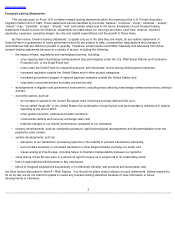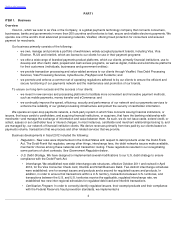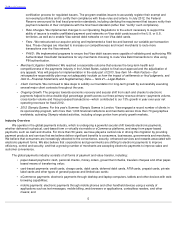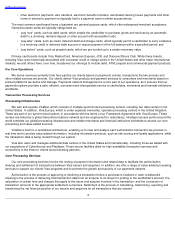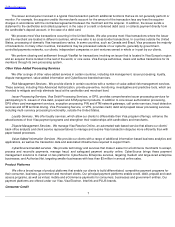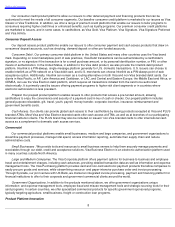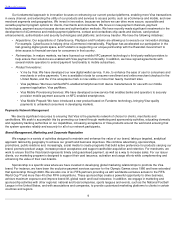Visa 2012 Annual Report Download - page 15
Download and view the complete annual report
Please find page 15 of the 2012 Visa annual report below. You can navigate through the pages in the report by either clicking on the pages listed below, or by using the keyword search tool below to find specific information within the annual report.
Table of Contents
transactions without limitation. Recently, the Reserve Bank of Australia, while reinforcing its position that surcharging is appropriate
in that market, has taken steps that would allow us to limit the level of surcharges that merchants can impose. Additionally, in the
United States there are ten states that prohibit the use of the surcharge as an anti-consumer practice through their state
legislatures.
Data Protection and Information Security. We devote substantial resources to maintain and to continually refine our
information security program in order to comply with U.S. federal and state and foreign regulations safeguarding cardholder
information and requiring consumer notification in the event of a security breach. In addition, the U.S. Federal Financial Institution
Examination Council periodically reviews certain of our operations in the United States to examine our compliance with data
integrity, security and operational requirements and standards, as well as other requirements applicable to us because of our role
as a service provider to financial institutions.
Anti-Money Laundering, Anti-Terrorism and Sanctioned Countries. In response to U.S. and other regulations, we devote
substantial resources to maintain and to continually refine a program to prevent the use of our payments system to facilitate money
laundering and the financing of terrorist activities. We also prohibit from being Visa members all financial institutions that are
domiciled in countries sanctioned by the U.S. Treasury's Office of Foreign Assets Control—currently Cuba, Iran, Syria and Sudan.
In addition, we refrain from any financial dealings with restricted third parties, such as identified money-laundering fronts for
terrorists and narcotics traffickers.
Government-Imposed Market Participation Influences and Restrictions. Our business's reach remains limited by certain
governments' influence on domestic payments competition and/or protection of domestic payment card providers or payment
processing providers. Most notably, none of our financial institution clients in China have received authorization to issue cards
carrying only our brands for domestic use in China, limiting our opportunities in that market. Regulators in an increasing number of
countries around the world, including recently Thailand, Ukraine, the UAE, Mexico, Colombia and Russia, have received statutory
authority to regulate certain aspects of the payments systems in these countries.
Regulation of Internet Transactions . Many jurisdictions have adopted or are in the process of adopting new regulations and
taxes on Internet transactions. Most notably, we have had to implement compliance programs in response to new U.S. regulations
requiring the coding and blocking of payments for certain types of Internet gambling transactions.
In addition, the U.S. Congress continues to consider regulatory initiatives in the areas of Internet prescription drug purchases,
copyright and trademark infringement, and privacy, among others, that could impose additional compliance burdens on us and/or
our clients. Some U.S. states are considering a variety of similar legislation. If implemented, these initiatives could require us or our
clients to monitor, filter, restrict, or otherwise oversee various categories of payment card transactions, thereby increasing our costs
or decreasing our transaction volumes.
Various regulatory agencies also continue to examine a wide variety of issues, including identity theft, account management
guidelines, privacy, disclosure rules, security and marketing that would affect our clients directly. These new requirements and
developments may affect our clients' ability to extend credit by using payment cards, which could decrease our transaction
volumes. In some circumstances, new regulations could have the effect of limiting our clients' ability to offer new types of payment
programs or restricting their ability to offer our existing programs such as stored value cards.
Intellectual Property
We rely on a combination of patent, trademark, copyright and trade secret laws in the United States and other jurisdictions, as
well as confidentiality procedures and contractual provisions, to protect our proprietary technology. We own a number of patents
and patent applications relating to payments solutions, transaction processing, security systems and other matters. We own
numerous valuable trademarks and designs, covering various brands, products, programs and services, which are essential to our
business in multiple countries, including, but not limited to Visa, Interlink, PLUS, Visa Electron, the “Winged V” design, and the
“Dove” design. Through agreements with our clients, we authorize and monitor the use of our trademarks in connection with their
participation in our payments network.
Competition
We compete in the global payment marketplace against all forms of payment, including paper-based forms, principally cash
and checks; card-based payments, including credit, charge, debit, ATM, prepaid, private-label and
13


